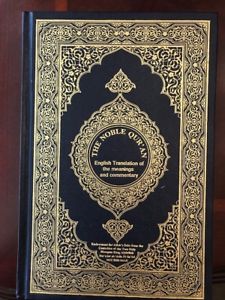CHAPTER 11
EXAGGERATED STATEMENT ABOUT
THE HOLY QUR’AN
‘Abdullah Ibn ‘Umar (Allah be pleased with him) reported Allah’s Messenger (peace and blessings of Allah
be upon him) as saying: May I tell you a practice by which you will become a permanent reciter of the
Holy Qur’an. I submitted: “Why not ? O’ Messenger of Allah! I always intend to seek piety and virtue.”
Whereupon he (the Holy Prophet) said: “Fast the most superior type of fasting (that is the fasting of
(Prophet) Dawud (peace be upon him). He was the greatest worshipper. Recite the whole Qur’an in one
month’s time.” I said, “But I have power (to do more than that).” Allah’s Apostle (peace and blessings of
Allah be upon him) said, “Then finish the recitation of the whole Qur’an in ten days’ time.” I said, ‘But I
have power (to do more than that).” Allah’s Apostle (peace and blessings of Allah be upon him) said, “Then
finish the recitation of Qur’an in seven days, and do not finish it in less than this period.” Bukhari
transmitted it.
‘Abdullah Ibn Mas’ad (Allah be pleased with him) reported Allah’s Messenger (peace and blessings of
Allah be upon him) as saying: “Those who exceeded the prescribed limit were destroyed.”
There is a marfu’ tradition reported by ‘Abdur Rahman Ibn Shibli in Musnad of Imam Ahmad. He said:
Recite the Holy Qur’an and do not indulge in exaggeration about it; and do not show faithlessness to the
Holy Qur’an; and do not make it a source of your livelihood.
Abu Rafi’ (Allah be pleased with him) reported Allah’s Messenger (peace and blessings of Allah be upon
him) as saying: May I not see any person in such a state of carelessness that whenever any order of mine
whether positive or negative is communicated to him, he says: I do not know, we shall follow only that
which we find in the Book of Allah. Abu Dawud and Tirmidhi transmitted it.
CHAPTER 12
THE MANDATE OF THE HOLY PROPHET
(peace and blessings of Allah be upon him) IN
RESPECT OF ALLEGORICAL VERSES
A’isha (Allah be pleased with her) reported that Allah’s Messenger (peace and blessings of Allah be upon
him) recited the following Verse:
“He it is Who hath revealed unto thee (Muhammad) the Scripture wherein are clear revelations -They are
the substance of the Book- and others (which are) allegorical. But those in whose hearts is doubt pursue,
forsooth, that which is allegorical seeking (to cause) dissension by seeking to explain it. None knoweth its
explanation save Allah. And those who are of sound instruction say: We believe therein; the whole is from
our Lord ; but only men of understanding really heed.’‘ (3 : 7)
After reciting this verse he (the Holy Prophet) said: When you see people following allegorical verses, keep
yourself aloof from them because the Almighty Allah has ordained to do so.
Hadrat ‘Umar (Allah be pleased with him) said: Going astray of a learned, disputation of a hypocrite on
Qur’anic issues and decision of wicked Imams ruin the structure of Islam.
When Subigh asked Hadrat ‘Umar (Allah be pleased with him) about al-dhariyat and similar other
allegorical verses, he admonished him.
1. This is a well-known incident. For details please see Darimi Vol. I, p. 45.
CIHAPTER 13
ADMONITION TO THOSE WHO EXPRESS
THEIR OPINION IN THE HOLY
QUR’AN WITHOUT KNOWLEDGE
The Holy Qur’an says:
“Say: My Lord forbidden only indecencies, such of them as are apparent and such as are within, and sin
and wrongful oppression, and that ye associate with Allah that for which no warrant hath been revealed and
that ye tell concerning Allah that which ye know not.”
(7 :33)
‘Abdullah Ibn ‘Abbas (Allah be pleased with him) reported Allah’s Messenger (peace and blessings of Allah
be upon him) as saying: “Let him who interprets the Qur’an in the light of his own opinion come to his
abode in hell.” A version has: “Let him who interprets the Qur’an without knowledge come to his abode in
hell.” Tirmidhi transmitted it, saying it is a hasan hadith.
Jundub (Allah be pleased with him) reported Allah’s Messenger (peace and blessings of Allah be upon him)
as saying: If anyone interprets the Qur’an in the light of his own opinion and is right, he has erred.”
Tirmidhi and Abu Dawud transmitted it, saying it is a gharib hadith.
CHAPTER 14
DISPUTATION ABOUT THE QUR’ANIC
REVELATIONS
The Holy Qur’an says:
“None argue concerning the revelations of Allah save those who disbelieve.” (40 : 4)
In another Verse the Almighty Allah says:
“Lo ! those who find (a cause of) disagreement in the Scripture are in open schism.”
(2 : 176)
Abu al-‘Aliya says: There is a stern warning to those who dispute about the Qur’anic revelations.
Abu Huraira (Allah be pleased with him) reported Allah’s Messenger (peace and blessings of Allah be upon
him) as saying: “Disputation about the Holy Qur’an is infidelity.” Ahmad and Abu Dawud transmitted it.
‘Amr b. Shu’aib quoted the authority of his father from his grandfather who said that the
Prophet, (peace and blessings of Allah be upon him) heard some people disagreeing about the Holy Qur’an
and said, “It was just on this account that your predecessors perished: “They set parts of Allah’s Book
against others, whereas Allah’s Book was sent down only to be consistent; so do not use parts of the Holy
Qur’an to falsify others. Speak about as much of it as you know, but where you are ignorant entrust it to
him who knows.” Ahmad and Ibn Maja transmitted if.
CHAPTER 15
THE CONSEQUENCE OF DISPUTE
REGARDING THE WORDS AND MEANINGS
OF THE HOLY QUR’AN
The Holy Qur’an says :
“Yet they cease not differing. Save him on whom thy Lord hath mercy. (11 : 118)
In another Verse the Almighty Allah says:
“Mankind were one community and Allah sent (unto them) Prophets as bearers of good tidings and as
warners.” (2 : 213)
‘Abdullah Ibn Mas’ud (Allah be pleased with him) said: I heard a man who recited a Verse and as I had
heard the Prophet (peace and blessings of Allah be upon him) reciting differently I took him to the Prophet
(peace and blessings of Allah be upon him) and told him and noticed that he gave a disapproving look. He
(the Holy Prophet) then said, “Both of you are doing it well, so do not disagree, for your predecessors
disagreed and perished.” Bukhari transmitted it.
‘Abdullah b. ‘Umar (Allah be pleased with him) reported: I went to Allah’s Messenger (peace and blessings
of Allah be upon him) in the morning and he heard the voice of two persons who had an argumentation
with each other about a Verse. Allah’s Apostle (peace and blessings of Allah be upon him) came to us (and)
the (signs) of anger could be seen on his face. He said: Verily, the (peoples) before you were ruined
because of their disputation in the Book. (Muslim)
‘Amr b. Shu’aib (Allah be pleased with him) reported that we were sitting at the door of the house of Allah’s
Messenger (peace and blessings of Allah be upon him) when some of us had an argumentation with each
other about a Verse. The Messenger of Allah (peace and blessings of Allah be upon him) heard this
argumentation, came to (meet) us while we were disputing, and he was enraged, so that his face reddened
as though the seeds of the pomegranate were pressed upon his cheeks and he (the Holy Prophet) said,
“What! have ye been commanded to use the parts of Allah’s Book to falsify others or was I sent to you with
this? Some people before you were misled only because they disputed like you. This is not your job. You
should act upon what you have been commanded to do and abstain from what you have been commanded
to abstain.
According to another version when the Holy Prophet (peace and blessings of Allah be upon him) came out
they were disputing over the question of Divine Decree. Tirmidhi transmitted it on the authority of Abu
Huraira (Allah be pleased with him) with the following words:
“The Holy Prophet (peace and blessings of Allah be upon him) came out and we were disputing over the
question of Divine Decree.”
Tirmidhi has termed it a hasan hadith.



